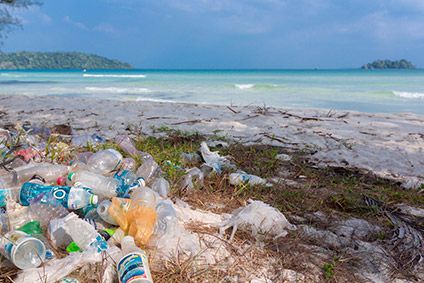
Concerns over ocean plastics pollution, and demands for brands that offer more transparency into their behind-the-scenes processes, are two European consumer trends that will impact the fashion industry in 2018.
Over the coming year, market intelligence agency Mintel believes lobbying campaigns will make consumers more aware of ocean plastic and its impact on wildlife and their own health, while politics will focus European consumer attention on marine conservation.

Discover B2B Marketing That Performs
Combine business intelligence and editorial excellence to reach engaged professionals across 36 leading media platforms.
“More and more brands will offer education and leadership with clean, safe and sustainable products, as they seek to highlight, and safeguard, the purity and future supply of their ocean ingredients,” explains Richard Cope, senior trends consultant at Mintel
“Whilst plastics won’t be wholly demonised, intensified eco-lobbying will produce more recyclable products, as well as incentives and initiatives to encourage sustainable behaviour.
“Fashionable, premium ocean plastic products will promote this trend in the coming year, with half (49%) of UK consumers saying they would be interested in buying fashion items made wholly or partially from recycled plastic.”
Truth and transparency
Another trend identified in Mintel’s ‘European Consumer Trends 2018’ report is for brands to court consumers with transparency, simplicity and evidence.

US Tariffs are shifting - will you react or anticipate?
Don’t let policy changes catch you off guard. Stay proactive with real-time data and expert analysis.
By GlobalData“Consumer distrust in governments and media is spreading to companies, and so is the clamour for truth and transparency in ingredients and behind-the-scenes processes,” notes Catherine Cottney, manager of trends at Mintel.
“Consumers are utilising the tools at their disposal to keep an eye on what companies are doing, with Mintel research indicating that at least half of Polish (60%), German (54%) and French (50%) consumers agree that the increased ability of consumers to communicate and find information, for instance via social media and the internet, is forcing companies to be more transparent.”
Among other pointers for the year ahead is a more guarded response from consumers who will hold on tight to their data and demand something in return before sharing it. “This effectively reboots the digital settings of the brand-consumer relationship and from now on brands will need to proffer economically or personally compelling incentives for consumers to resume sharing their information with them,” Cope says.
And as teens are increasingly defined by anxieties around their appearance, health and work, they are looking for brands to alleviate the pressure and help them build both their confidence and prospects. They will be quick to call out brands promoting unrealistic ideals and quick to support those embracing diversity, the report adds.





